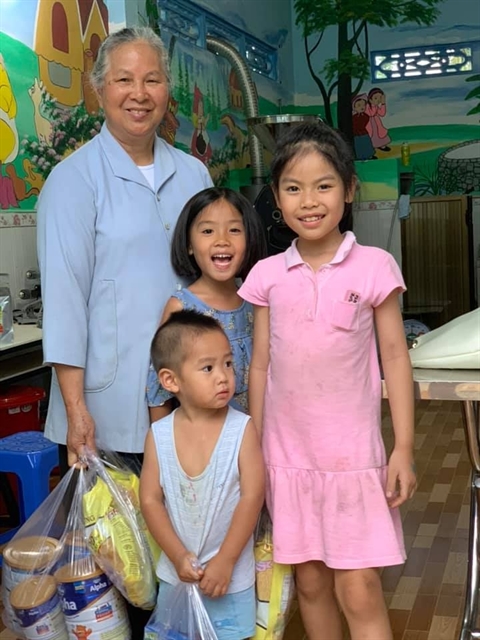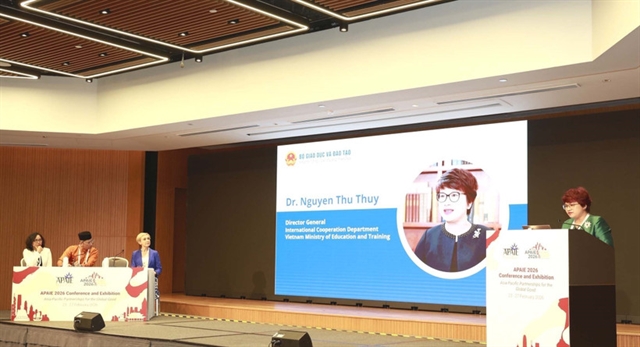


|
| KIND HEART: Nun Nguyễn Thị Hường, the founder of Tín Thác Foster House, is pictured with the children raised in the house. Photo Thanh Hải’s Facebook |
By Phương Hà
There is a special home in Bảo Lộc City in the Central Highlands province of Lâm Đồng that is always filled with the laughter of children. This home is Tín Thác Foster House.
Over the past ten years since its establishment, over 100 orphans have been raised and nurtured there with the love of nuns and the joint support of volunteers and benefactors nationwide.
Phúc Ân, the eldest of the 100 children, was the first orphan who was saved and raised by nun Nguyễn Thị Hường, the founder of Tín Thác Foster House.
One day, the 63-year-old nun discovered a pale little boy, weighing just 1.3kg, wrapped in a woman’s shirt and placed in a cardboard box by the road. She brought him home and called him Phúc Ân.
After three months, with the nuns’ care, the tiny boy gained nearly 2 kilos.
Day by day, Hường and other nuns continued to welcome more abandoned children to the house, some of whom were just several days old wrapped in torn clothes, left in bags or boxes by the roads, in the bushes or in front of hospitals.
Like their eldest brother, all the children are named Ân – like Hồng Ân, Thiên Ân, Khánh Ân or Gia Ân – as a tribute to families who have been willing to foster the children when Tín Thác House was unable to.
“We have always loved the orphans like our own children. We are willing to be their mums to take care of them and educate them,” Hường says.
Established in 2009, Tín Thác Foster House cares for 66 orphans, aged between two months and 10 years old, while some others have been sent to local boarding schools.
The house has been extended with a spacious garden and enough bedrooms for boys, girls and new-borns, as well as a playground and dining rooms.
“When he was alive, President Hồ Chí Minh wished that all Vietnamese children had enough food, clothes and could go to school. We also hold the same wish for the children we have been raising. Therefore, we have tried our best to care for them and let them attend school to absorb new knowledge and become good citizens,” Hường says.
Among the children are some with mental or communicative disabilities, which might be due to their poor conditions on being abandoned, Hường says.
“The majority of them are just a few days old when they are abandoned, deprived of breast milk and getting cold as they are simply wrapped in old cloths. Some have suffered from insect bites and poor immunization that leads to constant sickness and communicative disabilities,” she adds.
The care of such handicapped children is difficult, demanding specific methods and attention, but fortunately, they have been raised with the unconditional love of the nuns and the kind-hearted benefactors.
The house does not only offer the disadvantaged children food and clothes but also creates a familial atmosphere. The small children get together in the house and play with each other while the older ones help the nuns feed the younger ones and treat them like siblings.
According to nun Hoàng Thị Cúc, who has been staying in the foster house for the past five years, the children are classified into age groups under the care of specific nuns for better management of their health and education.
“Each age group has different hardships but thankfully, all of them are obedient and keen on learning,” the 73-year-old nun says.
“Seeing them growing up and caring for each other is our biggest happiness,” Hường says.
Every month, Tín Thác Foster House uses their limited budget on buying milk, books and necessary personal items for the children.
However, more and more individuals, social organisations and local authorities have chipped in to improve the children’s home.
One of such benefactor is Nguyễn Thị Thu Thủy, a retiree from Bảo Lộc City. She frequently takes money from her pension to buy milk and treats for the children at the house, whom she considers her own grandchildren. Thủy has also appealed to other friends and acquaintances to support the kids.
Meanwhile, the local authority has helped with issuing birth certificates or medical insurance cards for the children to attend school.
Recently, Lâm Đồng Province has granted a certificate of merit to Tín Thác Foster House for their achievements in taking care of abandoned children.
“Our acts aim to lessen sad stories in this life and offer a home for the orphans," Hường says.
“I want to advise the youth to have pure love and live responsibly so that there would be no more children abandoned.” VNS
GLOSSARY
This home is Tín Thác Foster House.
To foster a child means to take it in and look after it but not to adopt it and officially make it your own.
Over the past ten years since its establishment, over 100 orphans have been raised and nurtured there with the love of nuns and the joint support of volunteers and benefactors nationwide.
Establishment, in this case means “coming about”.
Nurtured means “looked after with care while growing”.
Volunteers are people who work without expecting to be paid.
Benefactors are people who give money to a cause.
Nationwide means “all over the country”.
Phúc Ân, the eldest of the 100 children, was the first orphan who was saved and raised by nun Nguyễn Thị Hường, the founder of Tín Thác Foster House.
An orphan is a child whose parents are dead.
A nun is a woman who has chosen to serve a religion and joined a religious institution to do so rather than have a family.
The founder of the house is the person who started it.
Day by day, Hường and other nuns continued to welcome more abandoned children to the house, some of whom were just several days old wrapped in torn clothes, left in bags or boxes by the roads, in the bushes or in front of hospitals.
Children who are abandoned are given up and left to fend for themselves.
Like their eldest brother, all the children are named Ân – like Hồng Ân, Thiên Ân, Khánh Ân or Gia Ân – as a tribute to families who have been willing to foster the children when Tín Thác House was unable to.
A tribute is a way to showing appreciation to someone.
Established in 2009, Tín Thác Foster House cares for 66 orphans, aged between two months and 10 years old, while some others have been sent to local boarding schools.
Boarding schools are schools where the children live during the term time.
The house has been extended with a spacious garden and enough bedrooms for boys, girls and new-borns, as well as a playground and dining rooms.
Extended means “made bigger”.
Spacious means big and with lots of space.
“Therefore, we have tried our best to care for them and let them attend school to absorb new knowledge and become good citizens,” Hường says.
Absorb means “take in”.
Among the children are some with mental or communicative disabilities, which might be due to their poor conditions on being abandoned, Hường says.
Mental means “to do with the mind”
Communicative disabilities are things that are wrong with someone that makes it difficult for that person to send messages to others by talking, writing or showing signs. These three things are all ways of communicating.
“The majority of them are just a few days old when they are abandoned, deprived of breast milk and getting cold as they are simply wrapped in old cloths.”
Majority means “most”.
To be deprived of breast milk means to not have any.
“Some have suffered from insect bites and poor immunization that leads to constant sickness and communicative disabilities,” she adds.
Immunization is the process of having injections as a baby to prevent catching diseases later on in life.
The care of such handicapped children is difficult, demanding specific methods and attention, but fortunately, they have been raised with the unconditional love of the nuns and the kind-hearted benefactors.
To be handicapped means to suffer from something that makes it difficult to go forward in life.
Unconditional love means “love, no matter what”.
The house does not only offer the disadvantaged children food and clothes but also creates a familial atmosphere.
A familial atmosphere is a family mood, or feeling.
The small children get together in the house and play with each other while the older ones help the nuns feed the younger ones and treat them like siblings.
Your siblings are both your brothers and your sisters.
“Each age group has different hardships but thankfully, all of them are obedient and keen on learning,” the 73-year-old nun says.
Obedient means law-abiding.
Every month, Tín Thác Foster House uses their limited budget on buying milk, books and necessary personal items for the children.
A budget is the amount of money you have planned to spend on something.
She frequently takes money from her pension to buy milk and treats for the children at the house, whom she considers her own grandchildren.
A pension is an amount of money that has been saved for when you stop working.
Thủy has also appealed to other friends and acquaintances to support the kids.
Appealed means “asked”.
Acquaintances are people you know. They do not need to be friends or enemies.
Meanwhile, the local authority has helped with issuing birth certificates or medical insurance cards for the children to attend school.
A birth certificate is a document that shows that the State knows you have been born and exist.
Medical insurance cards are cards to prove that you have medical insurance.
Recently, Lâm Đồng Province has granted a certificate of merit to Tín Thác Foster House for their achievements in taking care of abandoned children.
A certificate of merit is a certificate to show that you have done something good.
I want to advise the youth to have pure love and live responsibly so that there would be no more children abandoned.”
Responsibly means to do things in such a way that you know you must answer for them if things go wrong.
WORKSHEET
State whether the following sentences are true, or false:
ANSWERS: 1. False; 2. True; 3. True; 4. True; 5. True.




